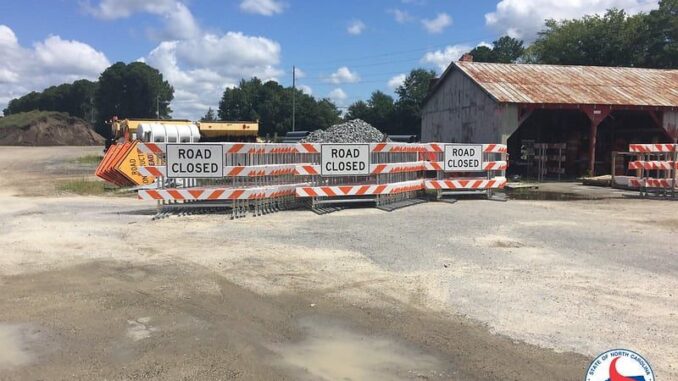
RALEIGH — A commission tasked with looking at ways to boost revenue streams for the N.C. Department of Transportation (NCDOT) has delivered a 173-page report recommending a $20 billion additional investment in the agency over 10 years.
Ward Nye, co-chair of the NC FIRST Commission and chairman, president and chief executive officer of Martin Marietta, said in a statement that “This report offers a roadmap to assure that North Carolina is positioned to succeed. Our remedies aren’t easy — but North Carolina doesn’t shrink from doing the hard, but right, thing. And this is it.”
“We really appreciate all the hard work and research the commission did to develop this report. It certainly gives policymakers a great deal to consider,” said NCDOT Secretary Eric Boyette.
The NC First Commission (NCFC) was formed in 2019 by former NCDOT Secretary James Trogdon in order to research potential ways to develop a “long-range transportation investment strategy.”
The recommendation means funding an additional $2 billion a year for the department, representing a budget increase of around 40%.
NCDOT’s current annual budget is $5.1 billion. Most of that funding (77%) is from three sources: the Motor Fuels Tax, the Highway Use Tax and Division of Motor Vehicles (DMV) fees. Federal funding makes up the balance, mainly coming from federal fuel taxes.
The NCDOT has been under fire during most of Gov. Roy Cooper’s first term after the agency was found to have overspent its budget by $2 billion in 2019. Subsequent state audits found overspending of $742 million, with an agency-wide lack of internal controls and oversight. A separate second audit also revealed improper salary adjustments.
The NCFC report gives a tiered approach, with options for long-term modernization of the NCDOT revenue streams and options that will create immediate impact at the state level and the local levels. The report analyzes construction and maintenance needs, with a deeper dive into revenue investment needs which are categorized into four grades, ranging from “A” to “D.” The increased revenue recommendations by the commission over the next 10 years would bring transportation spending closer to a “Grade B” rating.
Immediate impact options include expanding revenue sources but also hiking certain existing taxes, such as the Highway Use Tax (HUT) and expanding the number of toll roads in the state.
The commission says that increasing HUT from 3% to 5% will bring in additional revenue of $5.8 billion over the next 10 years.
“Until we get somewhere away from the three eggs we have right now, which is gas tax, highway use tax and DMV fees — all three of those are declining — and until we find some other means of revenue, I don’t know how the people’s highway network can continue to grow,” said Rep. John Torbett (R-Gaston), co-chair of the House Select Committee on Strategic Transportation Planning and Long Term Funding Solutions.
Torbett said no one likes to see additional tolling and taxes, but that additional funding options are becoming necessary. He also noted if tolls were added to existing roads, a new lane would have to be added, because state law doesn’t allow adding tolling to an existing road. An example might be the I-540 highway in Wake County, where the southern end is the only section currently tolled.
Additional immediate impact suggestions include taxing ride-sharing services, altering DMV fees for heavy vehicles and electric vehicles, adjusting DMV fees for inflation every two years, and adding “road impact fees” to e-commerce deliveries which significantly increased since the onset of the COVID-19 pandemic. Road impact fees would bring in an estimated $600 million for NCDOT and $290 million for municipalities.
Eliminating the net-of-trade exemption will bring in an estimated $1 billion. The net-of-trade exemption is trade-in value of a vehicle purchase and a vehicle sale that are made in one transaction. The report notes that “consumers with high trade-in values will pay the greatest share” if this exemption is removed.
Moving the proceeds from short-term vehicle rentals, vehicle subscription services and car sharing from the General Fund to the NCDOT’s budget would add over $800 million.
NCFC’s report recommends two sales tax increase options, both with offsets in the motor fuels tax rates. A one-half-percent sales tax increase, with an offset by a 9-cents-per-gallon Motor Fuels Tax decrease, would bring in $4.2 billion. Increasing the sales tax by three-quarters of a cent would be offset by a 14-cent-per-gallon motor fuels tax decrease for a net gain of $6.3 billion.
Transferring existing sales tax revenues from transportation-related goods and services to NCDOT would mean additional revenue of over $4.7 billion, and over $350 million could be brought in by taxing “Transportation Network Companies” such as Uber and Lyft.
Long-term modernization options suggested are a Mileage-Based User Fee, Public-Private Partnerships and setting up a State Infrastructure Bank. Franchising air space and monetizing rights of way were included in the value capture suggestions. NCFC also recommended expanding broadband connectivity, increasing debt capacities and adding a chief innovation officer to the NCDOT.
“Every dollar of capital investment in North Carolina produces at least $2.04 in increased output and business activity,” reads the NCFC report.
According to the report, deteriorated and congested roads cost North Carolina drivers $3.4 billion each year in higher vehicle ownership costs and transportation capital outlays. Maintenance expenditures totaled $7.4 billion in 2018.



